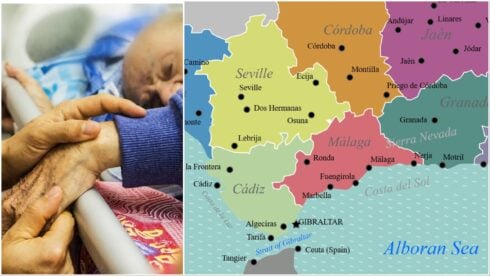A LEADING Spanish sleep expert has warned that parents are increasingly using screens as ‘digital babysitters’ and ‘electronic dummies’ for children as young as babies.
Dr Javier Albares, a specialist in clinical neurophysiology and member of both the Spanish Sleep Society, made the alarming observations whilst promoting his new book Generación Zombi (Zombie Generation).
“In Spain we have a serious problem with screens and minors,” he told Europa Press Health.
“It’s not just amongst teenagers, but also young children, even toddlers – we see babies being given screens at meal times, used as digital babysitters or electronic pacifiers.”
READ MORE: WATCH: Police bust gang selling weight-loss drug Ozempic and anabolic steroids in Spain

The neurophysiology expert argues that excessive screen time is damaging children during ‘critical stages of neurodevelopment and growth’, affecting their emotional, academic, physical and behavioural wellbeing.
He describes screens as ‘a silent, discreet drug that leaves no visible corpses’ and warns that for the first time in human history, a single addiction affects all ages equally.
Dr Albares points to concerning physical and mental health consequences.
Screen use leads to central nervous system overstimulation and emotional imbalance, whilst the sedentary nature increases risks of obesity and metabolic disorders.
READ MORE: Spain’s inflation rate goes up due to energy concerns over Middle East crisis
Mentally, he cites higher rates of anxiety, depression, bullying, self-harm and even suicidal ideation amongst heavy screen users.
Perhaps most worryingly for parents, he claims excessive screen use is hampering children’s ability to form real, empathetic relationships – a crucial aspect of healthy development.
“You only live once, and all you miss in childhood you won’t get back,” he warns.
The expert’s recommendations are likely to shock many modern families.
He suggests children shouldn’t receive mobile phones until around 16 years old, in line with the medical consensus not just for phones but all screens including tablets, computers and television.
READ MORE: Travel misery in Spain with 60 flights cancelled on second day of easyJet cabin crew strike
Currently, he observes Spanish teenagers using screens for seven to eight hours daily – far exceeding the recommended limit of under two hours.
Dr Albares also advocates removing screens from most classroom settings, arguing they hamper learning, neurodevelopment, language skills, vocabulary and spelling compared to traditional paper-based methods.
He calls for families to develop action plans to identify whether their screen use has become abusive or addictive, involving technology-addiction specialists where necessary.
However, the sleep specialist insists parents shouldn’t frame screen limits as punishment.
“It’s not punishment, it’s because we care. Screens harm sleep, mood and school performance,” he explains.
Instead, he encourages providing analogue toys and activities as alternatives, with parents leading by example.
The expert believes legal regulation similar to alcohol laws is essential, alongside a broader societal movement to protect children’s health through screen-neutral policies.
He argues that enforcing consistent bedtimes alone can reduce depression and suicidal ideation risks in teenagers by 25%.
Despite the concerning trends, Dr Albares remains optimistic that change is possible.
He insists that entering the digital world later doesn’t harm children – instead it preserves childhood, allowing time for physical activity, reading, music, social interaction, family time and proper sleep.
“Many families are already escaping the Zombie Generation,” he says, noting that those who follow his action plan – detecting problems, assessing usage, reducing screen hours and adopting healthy habits – report better sleep, healthier lives and improved wellbeing across the whole family.
Click here to read more Health News from The Olive Press.








